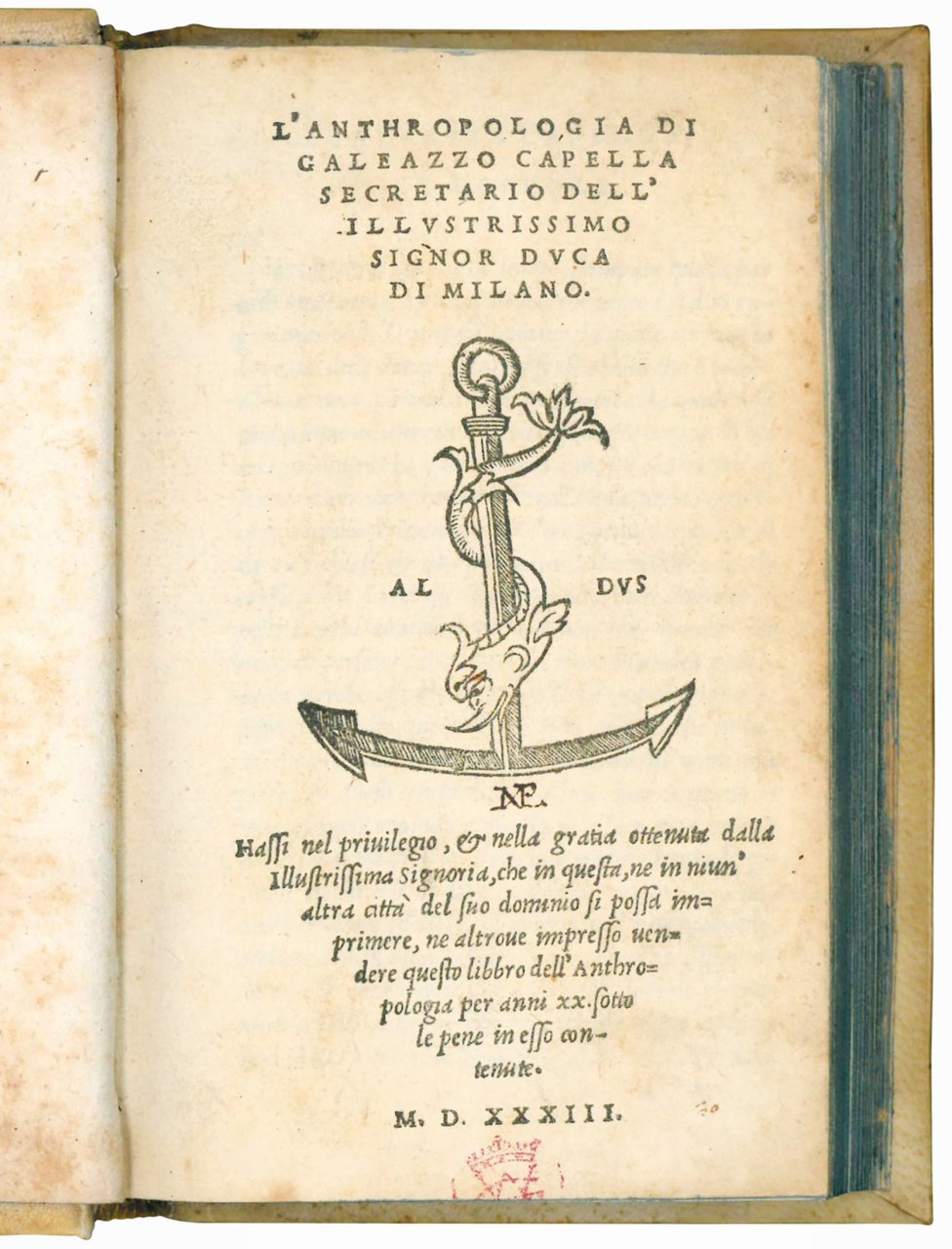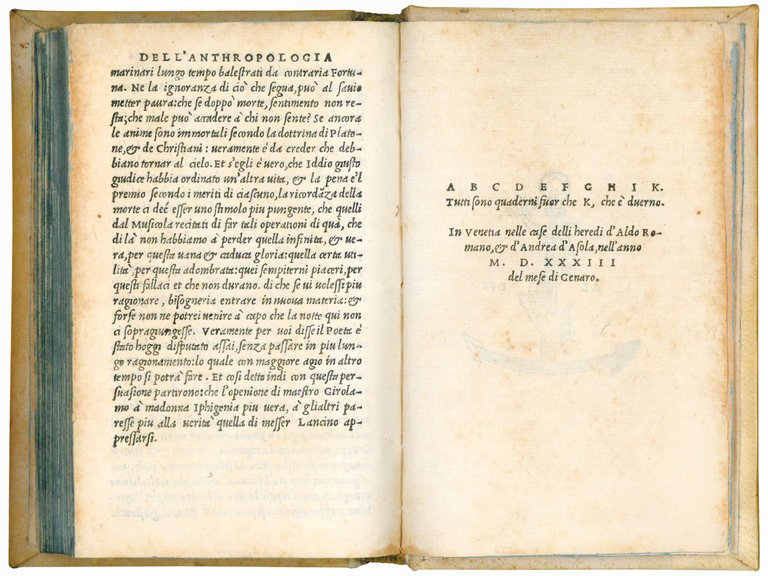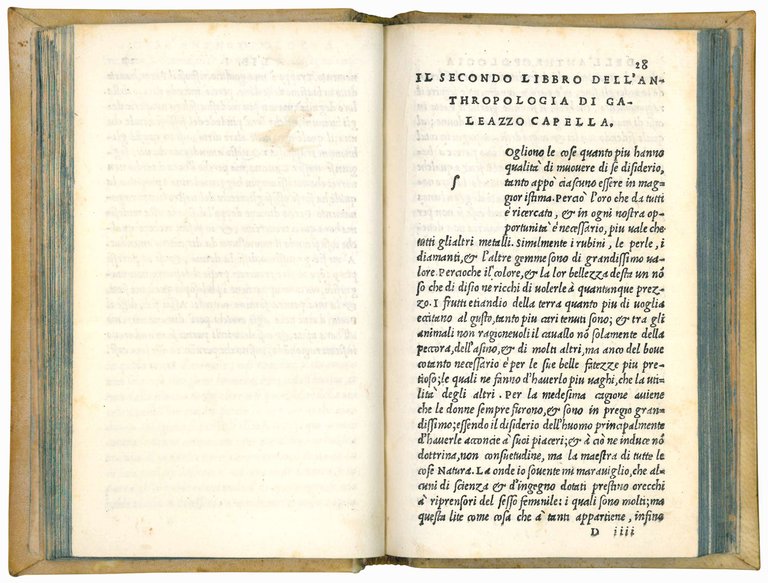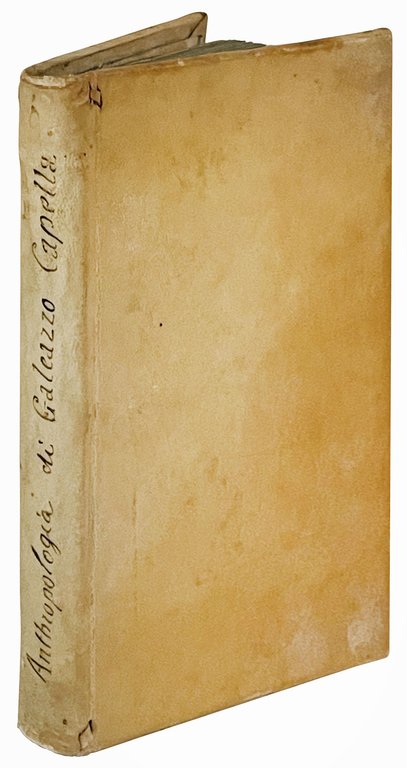



Libros antiguos y modernos
CAPELLA (or CAPRA), Galeazzo Flavio (1487-1537)
L'anthropologia di Galeazzo Capella secretario dell'Illustrissimo Signor Duca di Milano
Heirs of Aldus Manutius and Andrea Torresano, January 1533
1200,00 €
Govi Libreria Antiquaria
(Modena, Italia)
Los gastos de envío correctos se calculan una vez añadida la dirección de envío durante la creación del pedido. El vendedor puede elegir uno o varios métodos de envío: standard, express, economy o in store pick-up.
Condiciones de envío de la Librería:
Para los productos con un precio superior a 300 euros, es posible solicitar un plan de pago a plazos al Maremagnum. El pago puede efectuarse con Carta del Docente, Carta della cultura giovani e del merito, Administración Pública.
Los plazos de entrega se estiman en función de los plazos de envío de la librería y del transportista. En caso de retención aduanera, pueden producirse retrasos en la entrega. Los posibles gastos de aduana corren a cargo del destinatario.
Pulsa para saber másFormas de Pago
- PayPal
- Tarjeta de crédito
- Transferencia Bancaria
-
-
Descubre cómo utilizar
tu Carta del Docente -
Descubre cómo utilizar
tu Carta della cultura giovani e del merito
Detalles
Descripción
8vo (139x88 mm). 74 [i.e. 75], [1] leaves. Leaf 56 repeated in numbering. Collation: A-I8 K4. Printer's device on the title page and last leaf verso. Colophon on l. K4r. 18th-century vellum over boards, inked title on spine, blue edges. Giuseppe Arconati Visconti red stamp on the title page. Some light marginal foxing at the beginning and at the end of volume, otherwise a good copy.
First and only edition of this work, which includes the final revised version of Capella's treatise ‘On the dignity and excellence of women', first published in Rome in 1525 and then reprinted in Venice the following year.
From the first edition to the present third edition, significant changes, cuts and additions were made to the Della Eccellenza et Dignità delle Donne, and the author wrote a new preface. From this, we learn that Capella wrote the work in his early youth at the request of a woman (perhaps his wife), with the aim of defending women against centuries of denigration by poets and philosophers. This treatise marks the beginning of a vast body of literature on women in the sixteenth century, ranging from Book IV of B. Castiglione's Il Cortegiano to Agrippa von Nettesheim's De nobilitate foeminei sexus.
The treatise on the dignity and excellence of women forms the second part of the three-part Anthropologia. Book 1 is devoted to the dignity of man, while Book 3 analyses the relationship between the sexes. Through this tripartite structure and the form of a dialogical dispute, Capella attempted to balance the overly apologetic arguments in defence of women in the previous editions of Della dignità ed eccellenza delle donne with new arguments in favour of men. Ultimately, in the third part he aimed to resolve the dispute over the condition of both sexes by reaching a consensus.
The Della dignità ed eccellenza delle donne (‘On the dignity and excellence of women') is the necessary link between the Latin literary tradition and the vernacular tradition fuelled by the new ideology of the role of women and the growing success of love literature. Having first divided the causes that led many to speak ill of women into two categories (on the one hand, the hatred generated by unrequited love and, on the other, the weak arguments put forward in support of the superiority of men and the inferiority of women, summarised in the second chapter), Capella sets out to refute and overturn each of them by enumerating, from the third to the thirteenth chapter, all the virtues, according to a strictly scholastic scheme: first the theological virtues (charity, hope, faith), then the cardinal virtues (justice, fortitude, prudence, temperance), the goods of the practical and speculative intellect (magnanimity, love, doctrine), and finally the goods of fortune and beauty. Capella's discourse is constantly fed by a dense dialogue with numerous ancient (the Bible, Plato, Aristotle, Xenophon, Plutarch, Livy, Ovid, Tacitus, Valerius Maximus, St Paul, St Jerome) and modern (Petrarch, Boccaccio, Poliziano, Barbaro, Vives, Erasmus) sources. Capella is also concerned to do justice to the female literary tradition through the reconstruction of a wide range of women writers from Sappho to Erinna, from the Roman poetesses to Proba, from the Greek female philosophers to the “wise” queens, from the mythical Sibyls to the legendary Englishwoman Joan who became a cardinal and a pope. According to a strict rhetoric dispositio, the epilogue of the treatise in the final chapter repeats all the arguments and makes a final appeal to the recipient. For Capella, the woman exists not only “by necessity” because she can procreate, imitating in childbirth the “marvellous art” of God, but is an indispensable presence, without which life would just be “a loneliness, a perpetual sadness, even a perpetual death” (cf. M.L. Doglio, Introduzione, in: G.F. Capella, “Della eccellenza e dignità delle donne”, Rome, 1988, pp. 5-36).
“L'œuvre de Capra sur la dig

